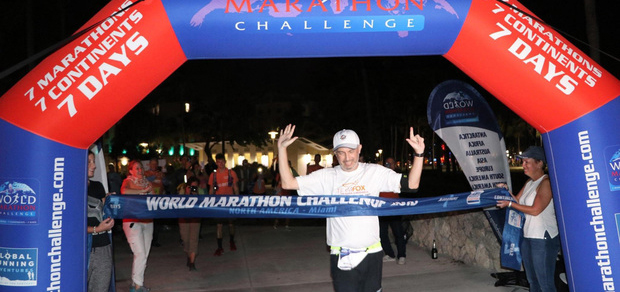Day after day, mile after mile, continent after continent, Bret Parker ’93 just kept running and walking, undeterred by jet lag, sleep deprivation, and blistered feet, toward his latest epic victory over Parkinson’s disease—the World Marathon Challenge’s finish line. Parker, age 49, had already completed six marathons on six continents in six days when he arrived on Feb. 5 in Miami, where his family and friends accompanied him, to his encouragement and amusement, as he pushed toward the conclusion of his seventh and final marathon.
“At one point, I felt like Forrest Gump when I was walking,” Parker recalled of the Miami marathon. “I joked that if I stopped, and said I was going back, what would happen to all the people behind me?”
Of course, there was no going back for Parker, the executive director of the New York City Bar Association, who competed in the World Marathon Challenge to raise money and awareness for Parkinson’s disease, which he was diagnosed with at age 38. Parkinson’s is a chronic, degenerative neurological disorder that affects 1 million people in the United States and 5 million worldwide. Parker sits on the Patient Council for the Michael J. Fox Foundation for Parkinson’s Research.
In the intervening decade since his diagnosis, Parker has continuously tackled new goals, whether marathons, mountain climbing, or skydiving, that allowed him to test his body’s limits and show others that a person with Parkinson’s can live a full life like anyone else. The World Marathon Challenge carried this credo to new lengths, literally.
The challenge started on Jan. 30 in Novo, Antarctica, and included subsequent marathons in Cape Town, South Africa; Perth, Australia; Dubai, United Arab Emirates; Lisbon, Portugal; Cartagena, Colombia; and Miami. For six straight days, Parker’s itinerary included a marathon followed hours later by a flight to the next day’s race location.
Parker prepared for the long distance and low recovery time by running marathons in Washington, D.C., and Chicago in October, and completing around 70 miles in a week leading up to the competition. He also trained in hot and cold weather to simulate the climate differences posed by Antarctica and the summer climates in southern hemisphere destinations Colombia, South Africa, and Australia. But what Parker couldn’t simulate was flying tens of thousands of miles, across several time zones, and then running on a few hours sleep. These factors combined made it necessary to up his Parkinson’s medication during the competition, he noted.
Even the conditions Parker trained for, such as Antarctica’s snow and ice, tested him in ways he did not expect. Relatively warm temperatures at the start of the Antarctica marathon forced him to remove a clothing layer, but as he progressed on the course, conditions became colder, windier, and more desolate, to the point that his iPhone froze and died for the rest of his 6-hour, 23-minute race. Parker struggled to speak at race’s end and his calves and hands suffered ill effects from the weather, he told the Washington Post.
Two days later in Australia, Parker notified supporters via a Facebook post that he did not know if he would finish his third marathon in time due to shin pain and a large foot blister. Instead, he finished with eight minutes to spare. The toughest race had “brought me over the hump that I might finish this,” he explained.
“I learned in some ways that I’m more stubborn, more determined, and tougher than I realized,” he said of the experience.
From there, Parker completed marathons in Dubai and Lisbon, and then flew to Cartagena, Colombia, where for the first and only time during the challenge a legal thought crossed his mind. As Parker neared the race’s end, joined on his walk by the race director, the two men took a wrong turn and sought out directions from police. In response, the officers asked both men to empty their pockets.
“The lawyer in me said this can’t be a legal search and seizure, but I recognized that I was in a foreign jurisdiction and kept my mouth closed,” Parker said, noting the officer eventually let the two men resume their trek.
The next day, Parker wrapped his whirlwind journey in the presence of family and friends. He praised his wife Katharine Parker ’92, a federal magistrate judge for the United States District Court for the Southern District of New York, for displaying the “patience of a saint” during his marathon preparation. The couple has two sons, Ben, 17, and Matt, 20. Parker credited Ben, a high school senior, for motivating him about his diet, training, and stretching regimes. The veteran lawyer also thanked the New York legal community for its incredible support.
While running the Chicago Marathon in October, Parker observed a woman whose shirt offered an in-your-face slogan that still resonates with him. (The safe-for-work version of the shirt: Do epic stuff.)
“Everyone has things they want to accomplish,” Parker shared. “Not everyone wants to run a marathon. For some it’s a three-mile run or a walk around the block. My hope is that people will take that slogan to heart.”
Participating in the World Marathon Challenge surpassed Parker’s expectations, he said, both in terms of his personal experience and the overall interest and support his efforts received. How will he top it?
“It may be tough to come up with something more epic,” he conceded.
—Ray Legendre

